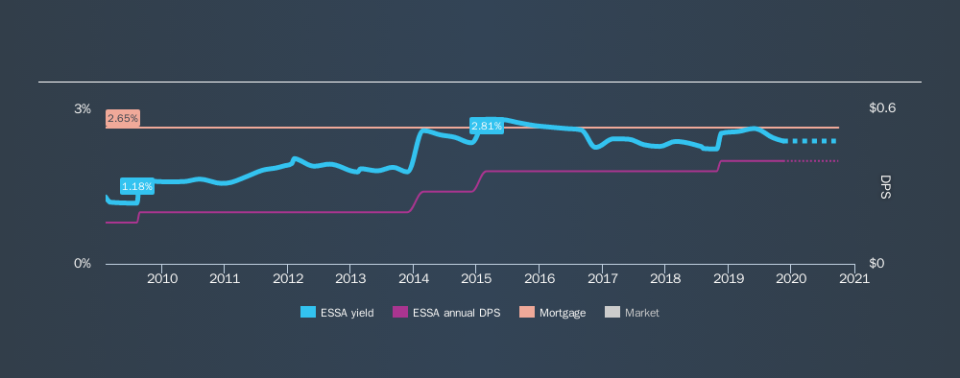How Does ESSA Bancorp, Inc. (NASDAQ:ESSA) Stand Up To These Simple Dividend Safety Checks?

Could ESSA Bancorp, Inc. (NASDAQ:ESSA) be an attractive dividend share to own for the long haul? Investors are often drawn to strong companies with the idea of reinvesting the dividends. If you are hoping to live on the income from dividends, it's important to be a lot more stringent with your investments than the average punter.
A 2.4% yield is nothing to get excited about, but investors probably think the long payment history suggests ESSA Bancorp has some staying power. The company also returned around 3.6% of its market capitalisation to shareholders in the form of stock buybacks over the past year. Before you buy any stock for its dividend however, you should always remember Warren Buffett's two rules: 1) Don't lose money, and 2) Remember rule #1. We'll run through some checks below to help with this.
Click the interactive chart for our full dividend analysis
Payout ratios
Dividends are typically paid from company earnings. If a company pays more in dividends than it earned, then the dividend might become unsustainable - hardly an ideal situation. So we need to form a view on if a company's dividend is sustainable, relative to its net profit after tax. Looking at the data, we can see that 34% of ESSA Bancorp's profits were paid out as dividends in the last 12 months. A medium payout ratio strikes a good balance between paying dividends, and keeping enough back to invest in the business. One of the risks is that management reinvests the retained capital poorly instead of paying a higher dividend.
Remember, you can always get a snapshot of ESSA Bancorp's latest financial position, by checking our visualisation of its financial health.
Dividend Volatility
From the perspective of an income investor who wants to earn dividends for many years, there is not much point buying a stock if its dividend is regularly cut or is not reliable. For the purpose of this article, we only scrutinise the last decade of ESSA Bancorp's dividend payments. During this period the dividend has been stable, which could imply the business could have relatively consistent earnings power. During the past ten-year period, the first annual payment was US$0.16 in 2009, compared to US$0.40 last year. Dividends per share have grown at approximately 9.6% per year over this time.
Dividends have grown at a reasonable rate over this period, and without any major cuts in the payment over time, we think this is an attractive combination.
Dividend Growth Potential
While dividend payments have been relatively reliable, it would also be nice if earnings per share (EPS) were growing, as this is essential to maintaining the dividend's purchasing power over the long term. Earnings have grown at around 8.4% a year for the past five years, which is better than seeing them shrink! Earnings per share have been growing at a credible rate. What's more, the payout ratio is reasonable and provides some protection to the dividend, or even the potential to increase it.
Conclusion
When we look at a dividend stock, we need to form a judgement on whether the dividend will grow, if the company is able to maintain it in a wide range of economic circumstances, and if the dividend payout is sustainable. Firstly, we like that ESSA Bancorp has a low and conservative payout ratio. We like that it has been delivering solid improvement in its earnings per share, and relatively consistent dividend payments. ESSA Bancorp fits all of our criteria, and we think it's an attractive dividend idea that would warrant further investigation.
Now, if you want to look closer, it would be worth checking out our free research on ESSA Bancorp management tenure, salary, and performance.
If you are a dividend investor, you might also want to look at our curated list of dividend stocks yielding above 3%.
We aim to bring you long-term focused research analysis driven by fundamental data. Note that our analysis may not factor in the latest price-sensitive company announcements or qualitative material.
If you spot an error that warrants correction, please contact the editor at editorial-team@simplywallst.com. This article by Simply Wall St is general in nature. It does not constitute a recommendation to buy or sell any stock, and does not take account of your objectives, or your financial situation. Simply Wall St has no position in the stocks mentioned. Thank you for reading.

